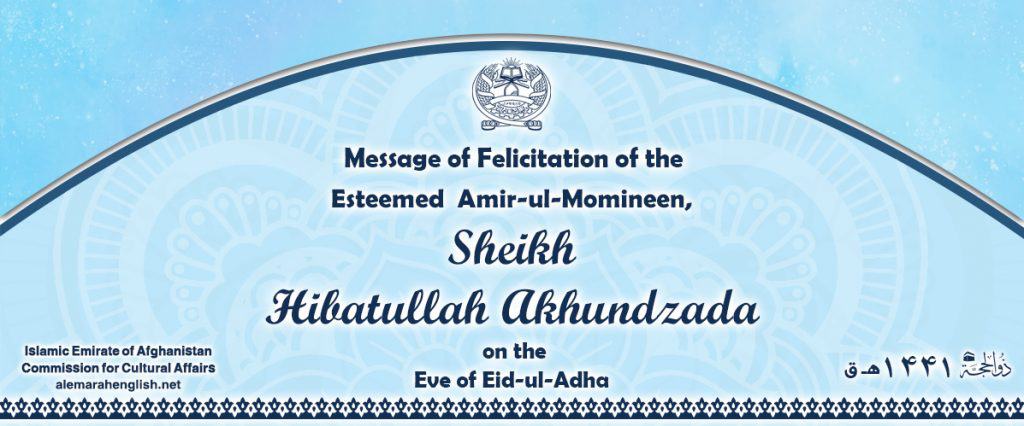
In his yearly Eid-ul-Adha message, Taliban emir Mullah Haibatullah Akhundzada issued a rallying cry to his fighters, saying the Taliban is “on the threshold of establishing an Islamic government” after two decades of fighting.
The Taliban has been adamant that the only acceptable outcome for the country is the return of the Taliban’s Islamic Emirate of Afghanistan with Haibatullah at its helm. In his statement, Haibatullah yet again called for the establishment of a “pure Islamic government” and an “Islamic system” for Afghanistan.
His message was released on July 28 on Voice of Jihad, the Taliban’s official website. Haibatullah mentioned the return of an “Islamic government,” “pure Islamic government,” and an “Islamic system” five times in his short statement.
Now, after signing a so-called ‘peace’ deal with the U.S. that facilitates the Americans’ withdrawal from Afghanistan, Haibatullah says the Taliban is finally close.
But contrary to the popular opinion that peace will be at hand once the Taliban conducts “intra-Afghan negotiations,” Haibatullah says that there will be peace once “a pure Islamic government” is established [emphasis ours]:
We do not hold personal vendetta against anyone but have raised arms to defend the sovereignty of our homeland and establish a pure Islamic government. We seek a peaceful life with everyone once those objectives have been met.
Message of Felicitation of the Esteemed Amir-ul-Mumineen, Sheikh-ul-Hadith Mawlawi Hibatullah Akhundzada (may Allah protect him), on the occasion of Eid-ul-Adha, Voice of Jihad. July, 28, 2020. [PDF]
Haibatullah’s Eid-ul-Adha message is entirely consistent with the Taliban’s position over the past two decades. He said this on May 21, 2020, less than three months after signing the much-misunderstood deal with the U.S.
“The objectives of our Jihad are to gain the pleasure of Allah (SwT), freedom of our country and to establish an Islamic system,” Haibatullah stated.
Just eight days after the U.S.-Taliban withdrawal deal was inked, the Taliban issued a religious decree that said that the return of the Islamic Emirate of Afghanistan with Haibatullah as its rightful leader was the only permissible result of intra-Afghan talks. The Taliban fatwa said the group “shall continue waging armed jihad” until it establishes the Islamic Emirate of Afghanistan.
In Sept. 2019, the Taliban said that its prime objectives in negotiations with the U.S. is to get Coalition forces to withdrawal from Afghanistan, and the “establishment of an Islamic government.”
The Afghan government is the problem
In Haibatullah’s Eid message, he notes that the Afghan government, which he calls “very small group”, is attempting to sabotage the Taliban’s objective of regaining full power. The Taliban couches this group’s position as standing in the way of the will of the Afghan people [emphasis ours]:
The biggest issue at hand that needs addressing by the international community is the subject of a very small group unaware of the pains and demands of society being imposed upon the economic resources, reserves and seat of power, whom care not for the higher national interests of Afghanistan, are engaged in a struggle for short-term interests and power, do not give importance to the long-term success and prosperity of the country, delay and obstruct national and other key processes and continually endanger the greater interests of our homeland.
Message of Felicitation of the Esteemed Amir-ul-Mumineen, Sheikh-ul-Hadith Mawlawi Hibatullah Akhundzada (may Allah protect him), on the occasion of Eid-ul-Adha, Voice of Jihad. July, 28, 2020. [PDF]
The Taliban has committed to conducting intra-Afghan negotiations, which means it will talk to a cross section of political, civil, and religious leaders, but the Taliban outright rejects direct negotiations with the Afghan government.
The Taliban views the Afghan government as “illegitimate,” “impotent,” a “puppet” and “stooge” of the West – and most importantly, “un-Islamic.” It has publicly stated it would never share power with the “Kabul administration,” an insult that implies the Afghan government controls little outside of the capital.
“The Islamic Emirate has not readily embraced this death and destruction for the sake of some silly ministerial posts or a share of the power,” the Taliban said in an official statement released on Voice of Jihad in 2016.
On June 10, 2020, the Taliban laid out its position on the Afghan government and Western-styled governments in general. In a video titled “Real Men 4,” the Taliban railed against the “deviants” of the Afghan government.
“The Deviants are those who are trained in the poisonous deviant beliefs of atheism, communism, secularism, democracy, and other satanic western and disbelieving ideologies in order to mislead the Muslims with their deviant ideologies,” The Taliban narrator stated in English. “The Deviants are the people who work for the implementation of secularism and deviant laws instead of sharia [Islamic law].”
The Taliban has been very clear that it will not compromise on its objective of resurrection of the Islamic Emirate of Afghanistan, and will continue to wage jihad until its objective is realized.
Yet U.S., NATO, and Afghan leaders continue to view intra-Afghan talks in which the Afghan government cannot attend as the solution.







